
|
시장보고서
상품코드
1858842
영양유전체학 기반 맞춤형 보충제 시장 기회, 성장 촉진요인, 산업 동향 분석 및 예측(2025-2034년)Nutrigenomics-Based Personalized Supplements Market Opportunity, Growth Drivers, Industry Trend Analysis, and Forecast 2025 - 2034 |
||||||
세계의 영양유전체학 기반 맞춤형 보충제 시장은 2024년 16억 달러로 평가되었으며 CAGR 15.8%를 나타내 2034년까지 67억 달러에 이를 것으로 추정됩니다.

이러한 현저한 성장은 유전체 과학의 획기적인 변화, AI 기반 진단의 활용 증가, 예방적 건강 솔루션으로의 변화 증가로 이어집니다. DNA 분석과 디지털 건강 플랫폼에 의해 지원되는 맞춤형 영양은 건강 지향 소비자가 맞춤형 웰빙 전략을 추구함에 따라 점점 더 주류가되고 있습니다. 시퀀싱의 비용 절감과 집에서의 유전자 검사의 가용성의 확대가 이러한 개별화 솔루션의 채용을 가속화하고 있습니다. 유전자 리터러시가 향상되고 인지가 확산됨에 따라, 소비자는 개인의 유전자 프로파일에 기초하여 맞춤형 보충제를 제공하는 플랫폼에 대한 참여를 강화하고 있습니다. 이 변화는 소비자 직접 판매 중립 유전체학 서비스에 대한 수요를 촉진하고 디지털 퍼스트 보충 회사에 새로운 비즈니스 기회를 제공합니다. 또한 DNA 마커를 해석하기 위해 AI와 머신러닝을 사용하는 플랫폼 전체의 기술 혁신을 통해 기업은 정확한 영양 처방을 제공할 수 있을 뿐만 아니라 모바일 통합 및 실시간 분석을 통해 사용자 경험을 향상시키고 있습니다.
| 시장 범위 | |
|---|---|
| 시작 연도 | 2024년 |
| 예측 연도 | 2025-2034년 |
| 시작 금액 | 16억 달러 |
| 예측 금액 | 67억 달러 |
| CAGR | 15.8% |
유전자 검사 키트 및 시약 부문은 2024년에 35%의 점유율을 차지했습니다. 이러한 이점은 정확한 개별화를 가능하게 하는 유전자 데이터가 수행하는 중심 역할에 기인합니다. 유전체 정보를 수집하고 분석하지 않고 맞춤 영양 개입을 설계할 수 없습니다. 마이크로어레이 플랫폼, 타액 기반 검사 키트, SNP 특이적 패널의 개선으로 이러한 도구는 가정에서 사용하기가 더 친숙하고 사용자 친화적이 되고 있습니다. 이러한 진보는 보다 폭넓은 소비자층에의 보급을 촉진하고, 고도로 맞춤화된 건강 전략의 기반을 구축하고 있습니다.
비만·체중관리 분야는 2024년에 24.2%의 점유율을 차지해 이 분야의 주요 응용 분야로 부상했습니다. 이것은 세계에서 10억명 이상의 성인이 앓고 있는 비만의 세계적인 유병률의 상승이 크게 영향을 미치고 있습니다. 보다 많은 소비자가 과학적 뒷받침 솔루션을 찾는 중, 영양유전체학은 유전자 마커를 통해 대사의 비효율성을 파악하는 능력으로 주목을 받고 있습니다. 지방 축적, 에너지 소비, 식욕 조절과 관련된 주요 변이체를 평가함으로써, 보충제 브랜드는 사용자 독자적인 생물학에 기초하여 체중 관리를 개선하기 위한 고도로 적극적인 개입 조치를 제공합니다.
미국의 영양유전체학 기반 맞춤형 보충제 시장은 2024년 4억 9,760만 달러를 창출했습니다. 미국은 소비자를 위한 유전공학을 빨리 도입하고 헬스케어 인프라가 발달하고 웰니스 문화가 활발해지기 때문에 이 분야를 선도하고 있습니다. 기존 기업과 신흥 기업 모두 유전자 과학과 디지털 영양 플랫폼을 융합시켜 혁신을 추진하고 있습니다. 경쟁이 치열한 생태계와 하이테크 주도 건강 솔루션에 대한 소비자의 관심 증가는 미국을 개별화 보충제의 세계 리더로 형성하는 데 도움이 되었습니다.
세계의 영양유전체학 기반 맞춤형 보충제 시장에서 사업을 전개하는 주요 기업으로는 GenoPalate, Rootine, myDNA, Nutrigenomix, Persona Nutrition, Zoe, InsideTracker, Elysium Health, DNAfit, Sun Genomics 등이 있습니다. 영양유전체학 기반 맞춤형 보충제 시장에서 확고한 발판을 구축하기 위해 각 회사는 첨단 유전자 분석 도구를 AI 및 머신러닝 기술과 통합하는 데 주력하고 있습니다. 많은 기업들은 지속적인 건강 모니터링과 맞춤형 영양 섭취를 제공하는 디지털 플랫폼과 구독 기반 모델을 통해 제품 제공을 확대하고 있습니다. 유전자 검사 기업과 디지털 건강 기업과의 전략적 제휴를 통해 보충 브랜드는 개인화의 정확성을 높일 수 있습니다. 기업은 또한 생체 측정, 식습관, 보충 교재를 추적하고 장기적인 참여를 향상시키는 사용자 친화적인 앱과 플랫폼에 투자하고 있습니다.
자주 묻는 질문
목차
제1장 조사 방법과 범위
제2장 주요 요약
제3장 업계 인사이트
- 업계 생태계 분석
- 공급자의 상황
- 이익률
- 각 단계에서의 부가가치
- 밸류체인에 영향을 주는 요인
- 파괴적 혁신
- 업계에 미치는 영향요인
- 성장 촉진요인
- 업계의 잠재적 리스크 및 과제
- 시장 기회
- 성장 가능성 분석
- 규제 상황
- 북미
- 유럽
- 아시아태평양
- 라틴아메리카
- 중동 및 아프리카
- Porter's Five Forces 분석
- PESTEL 분석
- 가격 동향
- 지역별
- 유형별
- 향후 시장 동향
- 기술과 혁신의 전망
- 현재의 기술 동향
- 새로운 기술
- 특허 상황
- 무역 통계
- 주요 수입국
- 주요 수출국
(참고 : 무역 통계는 주요 국가에 대해서만 제공됩니다)
- 지속가능성과 환경 측면
- 지속가능한 대처
- 폐기물 감축 전략
- 생산에 있어서 에너지 효율
- 환경 친화적인 노력
- 탄소발자국
제4장 경쟁 구도
- 서론
- 기업의 시장 점유율 분석
- 지역별
- 북미
- 유럽
- 아시아태평양
- 라틴아메리카
- 중동 및 아프리카
- 지역별
- 기업 매트릭스 분석
- 주요 시장 기업의 경쟁 분석
- 경쟁 포지셔닝 매트릭스
- 주요 발전
- 합병 및 인수
- 파트너십
- 신제품 발표
- 확장 계획
제5장 시장 추계·예측 : 유형별(2021-2034년)
- 주요 동향
- 유전자 검사 키트 및 시약
- 표적 SNP 패널
- 전장 유전체 시퀀싱
- 약물유전체학 검사
- 후생유전학적 분석
- AI 기반 해석 플랫폼
- 다중 오믹스 통합 플랫폼
- 예측 분석 엔진
- 임상 의사 결정 지원 시스템
- 소비자용 모바일 애플리케이션
- 맞춤형 보충제 제형
- 고정밀 비타민 및 미네랄
- 표적 영양 보조 식품
- 마이크로바이옴 기반 프로바이오틱스
- 성능 최적화 포뮬러
제6장 시장 추계·예측 : 용도별(2021-2034년)
- 주요 동향
- 비만 및 체중 관리
- 대사 유전자 변이 분석
- 식욕 조절 최적화
- 식이 반응 개인화
- 운동 및 라이프스타일 추천
- 심혈관 건강
- 지질대사 최적화
- 염증 반응 관리
- 식이지방반응 개인화
- 호모시스테인 대사 지원
- 당뇨병 및 대사 장애
- 포도당 대사 최적화
- 인슐린 감수성 향상
- 탄수화물 반응 개인화
- 당뇨병 합병증 예방
- 스포츠 영양 및 성능
- 근육 조성 최적화
- 에너지 대사 증진
- 회복 및 스트레스 반응
- 부상 예방 및 재활
- 웰니스 및 장수
- 노화 및 세포 건강
- 면역 체계 최적화
- 인지 기능 증진
- 스트레스 반응 관리
제7장 시장 추계·예측 : 최종 용도별(2021-2034년)
- 주요 동향
- 소비자 직접 판매 플랫폼
- 종합 다중 오믹스 제공업체
- 전문 검사 서비스
- 보충제 중심 브랜드
- 구독 박스 모델
- 의료 제공자
- 1차 진료 통합
- 전문 클리닉 및 기능성 의료
- 병원 시스템 및 건강 네트워크
- 등록 영양사 및 영양학자
- 기업용 웰니스 프로그램
- 대기업 프로그램
- 중견기업 복리후생
- 건강보험 통합
- 직장 웰니스 공급업체
- 소매 및 E-Commerce
- 약국 체인
- 건강식품 소매업체
- 일반 전자상거래 플랫폼
- 전문 소매점포
제8장 시장 추계·예측 : 지역별(2021-2034년)
- 주요 동향
- 북미
- 미국
- 캐나다
- 유럽
- 독일
- 영국
- 프랑스
- 스페인
- 이탈리아
- 기타 유럽
- 아시아태평양
- 중국
- 인도
- 일본
- 호주
- 한국
- 기타 아시아태평양
- 라틴아메리카
- 브라질
- 멕시코
- 아르헨티나
- 기타 라틴아메리카
- 중동 및 아프리카
- 사우디아라비아
- 남아프리카
- 아랍에미리트(UAE)
- 기타 중동 및 아프리카
제9장 기업 프로파일
- AKESOgen
- Baze
- Care/of
- DNAfit
- Elysium Health
- Fitgenes
- GenoPalate
- Habit
- Helix
- InsideTracker
- LifeNome
- myDNA
- Nutrigenomix
- Onegevity
- Persona Nutrition
- Rootine
- Sun Genomics
- Vitagene
- WellnessFX
- Zoe
- 기타
The Global Nutrigenomics-Based Personalized Supplements Market was valued at USD 1.6 billion in 2024 and is estimated to grow at a CAGR of 15.8% to reach USD 6.7 billion by 2034.

This significant growth is driven by breakthroughs in genomic science, the increasing use of AI-based diagnostics, and the rising shift toward preventive health solutions. Personalized nutrition, supported by DNA analysis and digital health platforms, is becoming increasingly mainstream as health-conscious consumers seek tailored wellness strategies. The reduced cost of sequencing and growing availability of at-home genetic testing are accelerating the adoption of these personalized solutions. As genetic literacy improves and awareness spreads, consumers are becoming more engaged with platforms that offer customized supplements based on individual genetic profiles. This shift is fueling demand for direct-to-consumer nutrigenomics services and creating new business opportunities for digital-first supplement companies. Additionally, innovation across platforms using AI and machine learning for interpreting DNA markers is enabling companies to deliver precise nutritional formulas while also enhancing the user experience through mobile integration and real-time analytics.
| Market Scope | |
|---|---|
| Start Year | 2024 |
| Forecast Year | 2025-2034 |
| Start Value | $1.6 Billion |
| Forecast Value | $6.7 Billion |
| CAGR | 15.8% |
The genetic testing kits and reagents segment held a 35% share in 2024. This dominance stems from the central role genetic data plays in enabling accurate personalization. Without collecting and analyzing genomic information, personalized nutrition interventions cannot be designed. Improvements in microarray platforms, saliva-based test kits, and SNP-specific panels are making these tools more accessible and user-friendly for home use. These advancements are pushing wider adoption across a broader consumer base, laying the groundwork for highly tailored health strategies.
The obesity and weight management segment held a 24.2% share in 2024, emerging as the leading application area within the space. This is largely influenced by the rising global prevalence of obesity, which affects more than a billion adults worldwide. As more consumers turn to science-backed solutions, nutrigenomics is gaining attention for its ability to pinpoint metabolic inefficiencies through genetic markers. By evaluating key variants linked to fat storage, energy usage, and appetite regulation, supplement brands are offering highly targeted interventions to help users better manage weight based on their unique biology.
U.S. Nutrigenomics-Based Personalized Supplements Market generated USD 497.6 million in 2024. The United States leads this space due to its early embrace of consumer genetics, advanced healthcare infrastructure, and a thriving wellness culture. Both established players and emerging startups are driving innovation by merging genetic science with digital nutrition platforms. The competitive ecosystem and growing consumer interest in tech-driven health solutions are helping shape the U.S. as a global leader in personalized supplementation.
Key companies operating in the Global Nutrigenomics-Based Personalized Supplements Market include GenoPalate, Rootine, myDNA, Nutrigenomix, Persona Nutrition, Zoe, InsideTracker, Elysium Health, DNAfit, and Sun Genomics. To establish a strong foothold in the nutrigenomics-based personalized supplements market, companies are focusing on integrating advanced genetic interpretation tools with AI and machine learning technologies. Many are expanding their product offerings through digital platforms and subscription-based models that provide continuous health monitoring and tailored nutrition. Strategic collaborations with genetic testing firms and digital health companies allow supplement brands to enhance personalization accuracy. Companies are also investing in user-friendly apps and platforms that track biometrics, dietary habits, and supplement adherence, improving long-term engagement.
Table of Contents
Chapter 1 Methodology & Scope
- 1.1 Market scope and definition
- 1.2 Research design
- 1.2.1 Research approach
- 1.2.2 Data collection methods
- 1.3 Data mining sources
- 1.3.1 Global
- 1.3.2 Regional/Country
- 1.4 Base estimates and calculations
- 1.4.1 Base year calculation
- 1.4.2 Key trends for market estimation
- 1.5 Primary research and validation
- 1.5.1 Primary sources
- 1.6 Forecast model
- 1.7 Research assumptions and limitations
Chapter 2 Executive Summary
- 2.1 Industry 360° synopsis
- 2.2 Key market trends
- 2.2.1 Regional
- 2.2.2 Type
- 2.2.3 Application
- 2.2.4 End Use
- 2.3 TAM Analysis, 2025-2034
- 2.4 CXO perspectives: Strategic imperatives
- 2.4.1 Executive decision points
- 2.4.2 Critical success factors
- 2.5 Future Outlook and Strategic Recommendations
Chapter 3 Industry Insights
- 3.1 Industry ecosystem analysis
- 3.1.1 Supplier Landscape
- 3.1.2 Profit Margin
- 3.1.3 Value addition at each stage
- 3.1.4 Factor affecting the value chain
- 3.1.5 Disruptions
- 3.2 Industry impact forces
- 3.2.1 Growth drivers
- 3.2.2 Industry pitfalls and challenges
- 3.2.3 Market opportunities
- 3.3 Growth potential analysis
- 3.4 Regulatory landscape
- 3.4.1 North America
- 3.4.2 Europe
- 3.4.3 Asia Pacific
- 3.4.4 Latin America
- 3.4.5 Middle East & Africa
- 3.5 Porter's analysis
- 3.6 PESTEL analysis
- 3.7 Price trends
- 3.7.1 By region
- 3.7.2 By type
- 3.8 Future market trends
- 3.9 Technology and Innovation landscape
- 3.9.1 Current technological trends
- 3.9.2 Emerging technologies
- 3.10 Patent Landscape
- 3.11 Trade statistics
- 3.11.1 Major importing countries
- 3.11.2 Major exporting countries
( Note: the trade statistics will be provided for key countries only)
- 3.12 Sustainability and Environmental Aspects
- 3.12.1 Sustainable Practices
- 3.12.2 Waste Reduction Strategies
- 3.12.3 Energy Efficiency in Production
- 3.12.4 Eco-friendly Initiatives
- 3.13 Carbon Footprint Considerations
Chapter 4 Competitive Landscape, 2024
- 4.1 Introduction
- 4.2 Company market share analysis
- 4.2.1 By region
- 4.2.1.1 North America
- 4.2.1.2 Europe
- 4.2.1.3 Asia Pacific
- 4.2.1.4 LATAM
- 4.2.1.5 MEA
- 4.2.1 By region
- 4.3 Company matrix analysis
- 4.4 Competitive analysis of major market players
- 4.5 Competitive positioning matrix
- 4.6 Key developments
- 4.6.1 Mergers & acquisitions
- 4.6.2 Partnerships & collaborations
- 4.6.3 New Product Launches
- 4.7 Expansion Plans
Chapter 5 Market Estimates and Forecast, By Type, 2021 - 2034 (USD Million)
- 5.1 Key trends
- 5.2 Genetic testing kits & reagents
- 5.2.1 Targeted SNP panels
- 5.2.2 Whole genome sequencing
- 5.2.3 Pharmacogenomic testing
- 5.2.4 Epigenetic analysis
- 5.3 AI-powered interpretation platforms
- 5.3.1 Multi-omics integration platforms
- 5.3.2 Predictive analytics engines
- 5.3.3 Clinical decision support systems
- 5.3.4 Consumer mobile applications
- 5.4 Personalized supplement formulations
- 5.4.1 Precision vitamins & minerals
- 5.4.2 Targeted nutraceuticals
- 5.4.3 Microbiome-informed probiotics
- 5.4.4 Performance optimization formulas
Chapter 6 Market Estimates and Forecast, By Application, 2021 - 2034 (USD Million)
- 6.1 Key trends
- 6.2 Obesity & weight management
- 6.2.1 Metabolic gene variants analysis
- 6.2.2 Appetite regulation optimization
- 6.2.3 Dietary response personalization
- 6.2.4 Exercise & lifestyle recommendations
- 6.3 Cardiovascular health
- 6.3.1 Lipid metabolism optimization
- 6.3.2 Inflammation response management
- 6.3.3 Dietary fat response personalization
- 6.3.4 Homocysteine metabolism support
- 6.4 Diabetes & metabolic disorders
- 6.4.1 Glucose metabolism optimization
- 6.4.2 Insulin sensitivity enhancement
- 6.4.3 Carbohydrate response personalization
- 6.4.4 Diabetic complication prevention
- 6.5 Sports nutrition & performance
- 6.5.1 Muscle composition optimization
- 6.5.2 Energy metabolism enhancement
- 6.5.3 Recovery & stress response
- 6.5.4 Injury prevention & rehabilitation
- 6.6 General wellness & longevity
- 6.6.1 Aging & cellular health
- 6.6.2 Immune system optimization
- 6.6.3 Cognitive function enhancement
- 6.6.4 Stress response management
Chapter 7 Market Estimates and Forecast, By End Use, 2021 - 2034 (USD Million)
- 7.1 Key trends
- 7.2 Direct-to-consumer platforms
- 7.2.1 Comprehensive multi-omics providers
- 7.2.2 Specialized testing services
- 7.2.3 Supplement-first brands
- 7.2.4 Subscription box models
- 7.3 Healthcare provider channel
- 7.3.1 Primary care integration
- 7.3.2 Specialty clinics & functional medicine
- 7.3.3 Hospital systems & health networks
- 7.3.4 Registered dietitians & nutritionists
- 7.3.5 Corporate wellness programs
- 7.3.6 Large enterprise programs
- 7.3.7 Mid-market employer benefits
- 7.3.8 Health plan integration
- 7.3.9 Workplace wellness vendors
- 7.4 Retail & e-commerce
- 7.4.1 Pharmacy chains
- 7.4.2 Health food retailers
- 7.4.3 General e-commerce platforms
- 7.4.4 Specialty retail locations
Chapter 8 Market Estimates and Forecast, By Region, 2021 - 2034 (USD Million)
- 8.1 Key trends
- 8.2 North America
- 8.2.1 U.S.
- 8.2.2 Canada
- 8.3 Europe
- 8.3.1 Germany
- 8.3.2 UK
- 8.3.3 France
- 8.3.4 Spain
- 8.3.5 Italy
- 8.3.6 Rest of Europe
- 8.4 Asia Pacific
- 8.4.1 China
- 8.4.2 India
- 8.4.3 Japan
- 8.4.4 Australia
- 8.4.5 South Korea
- 8.4.6 Rest of Asia Pacific
- 8.5 Latin America
- 8.5.1 Brazil
- 8.5.2 Mexico
- 8.5.3 Argentina
- 8.5.4 Rest of Latin America
- 8.6 Middle East and Africa
- 8.6.1 Saudi Arabia
- 8.6.2 South Africa
- 8.6.3 UAE
- 8.6.4 Rest of Middle East and Africa
Chapter 9 Company Profiles
- 9.1 AKESOgen
- 9.2 Baze
- 9.3 Care/of
- 9.4 DNAfit
- 9.5 Elysium Health
- 9.6 Fitgenes
- 9.7 GenoPalate
- 9.8 Habit
- 9.9 Helix
- 9.10 InsideTracker
- 9.11 LifeNome
- 9.12 myDNA
- 9.13 Nutrigenomix
- 9.14 Onegevity
- 9.15 Persona Nutrition
- 9.16 Rootine
- 9.17 Sun Genomics
- 9.18 Vitagene
- 9.19 WellnessFX
- 9.20 Zoe
- 9.21 Others



















